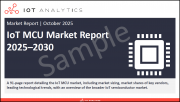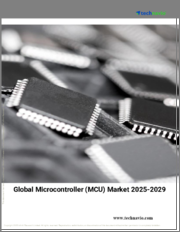
|
시장보고서
상품코드
1611711
IoT 마이크로컴퓨터 시장 - 규모, 점유율, 동향 분석 보고서 : 제품별, 용도별, 지역별, 부문 예측(2025-2030년)IoT Microcontroller Market Size, Share & Trends Analysis Report By Product (8 Bit, 16 Bit, 32 Bit), By Application (Smart Home, Consumer Electronics, Industrial Automation), By Region (North America, Europe), And Segment Forecasts, 2025 - 2030 |
||||||
IoT 마이크로컴퓨터 시장의 성장과 동향
Grand View Research, Inc.의 최신 보고서에 따르면 세계 IoT 마이크로컴퓨터 시장 규모는 2030년까지 129억 4,000만 달러에 달할 것으로 예상됩니다.
이 시장은 2025-2030년에 걸쳐 CAGR 16.3%를 나타낼 것으로 예측됩니다. 또한, 제조업, 의료, 에너지 및 전력 등의 산업에 있어서의 기업용 IoT 접속수의 급증도, 예측 기간중 시장 성장을 가속할 것으로 전망됩니다.
특히 유럽과 북미에서는 Zigbee, Bluetooth, KNX 기술 등의 근거리 무선 접속의 진보도 향후 몇 년간의 IoT 채용을 촉진할 것으로 예상됩니다. 파괴적 기술의 발전은 IoT 연결 장비의 채택을 더욱 촉진할 것으로 예상됩니다. Hypervolt, HIXAA, SmartRent 및 기타 중소기업과 같은 IoT 기반 신규 프로젝트를 획득하는 데 도움이 되는 신흥 기업에 대한 자금 제공으로 인한 투자 증가는 예측 기간 동안 고성능, 저전력 IoT 마이크로 컴퓨터 시장의 요구를 창출 할 가능성이 높습니다.
RENESAS Electric Corporation, NXP Semiconductors, STMicroelectronics와 같은 주요 IoT 마이크로 컴퓨터 제조업체는 수요를 충족시키기 위해 고성능 MCU를 혁신하고 있습니다. 예를 들어, 2022년 Renesas Electric Corporation는 32비트 RA 패밀리 MCU를 발매했습니다. 이 제품은 Arm Cortex-M23 코어를 기반으로 하며 산업 자동화, 의료기기, 지능형 소비자용 전자 기기, 웨어러블 등 IoT 엔드포인트용으로 개발된 소비자용 MCU입니다.
COVID-19의 발생은 2020년 IoT 마이크로컨트롤러 시장에 긍정적인 영향을 미쳤습니다. IoT 디바이스 수요가 급증하고, 생산 대수가 일시적으로 정지했기 때문에 2021년 시장에서는 MCU가 부족해, 수급 밸런스가 무너졌습니다. 이런 요인을 참고하면, 기기 제작사는 2022년까지 커넥티드 제품의 가격을 인상할 것으로 예상되며, 이는 2023년까지 계속될 것으로 보입니다.
IoT 마이크로 컴퓨터 시장 보고서 하이라이트
- 32비트는 2024년에 IoT 마이크로컴퓨터 시장 전체의 47% 이상 시장 점유율을 획득했으며, 시장 규모는 예측 기간 동안 건전한 CAGR을 나타낼 것으로 예상됩니다. 예측 기간 중 시장 성장이 기대됩니다.
- 산업 자동화 부문은 2024년 수익 점유율 33.1%로 시장을 독점하고 있습니다.
- 2024년에는 아시아태평양이 시장을 선도하고 있으며, 이 경향은 중기적으로도 계속될 것으로 예상됩니다. 시장의 성장을 시사하고 있습니다.
목차
제1장 조사 방법과 범위
제2장 주요 요약
제3장 IoT 마이크로컴퓨터의 변수, 동향, 범위
- 시장 소개/계통 전망
- 산업 밸류체인 분석
- 시장 역학
- 시장 성장 촉진요인 분석
- 시장 성장 억제요인 분석
- 산업의 기회
- IoT 마이크로 컴퓨터 분석 도구
- Porter's Five Forces 분석
- PESTEL 분석
제4장 IoT 마이크로컴퓨터 시장 : 제품별, 추정·동향 분석
- 부문 대시보드
- IoT 마이크로컴퓨터: 제품 변동 분석, 2023년과 2030년
- 8비트
- 16비트
- 32비트
제5장 IoT 마이크로컴퓨터 시장 : 용도별, 추정·동향 분석
- 부문 대시보드
- IoT 마이크로컴퓨터: 용도변동 분석, 2023년과 2030년
- 산업 자동화
- 스마트 홈
- 소비자용 전자 기기
- 스마트폰
- 웨어러블
- 기타
- 기타
제6장 IoT 마이크로컴퓨터 시장 : 지역별, 추정·동향 분석
- IoT 마이크로컴퓨터의 점유율, 지역별, 2023년과 2030년
- 북미
- 제품별, 2018-2030년
- 용도별, 2018-2030년
- 미국
- 캐나다
- 멕시코
- 유럽
- 제품별, 2018-2030년
- 용도별, 2018-2030년
- 영국
- 독일
- 프랑스
- 아시아태평양
- 제품별, 2018-2030년
- 용도별, 2018-2030년
- 중국
- 인도
- 일본
- 호주
- 한국
- 라틴아메리카
- 제품별, 2018-2030년
- 용도별, 2018-2030년
- 브라질
- 중동 및 아프리카
- 제품별, 2018-2030년
- 용도별, 2018-2030년
- 사우디아라비아
- 아랍에미리트(UAE)
- 남아프리카
제7장 경쟁 구도
- 주요 시장 진출기업에 의한 최근의 동향과 영향 분석
- 기업 분류
- 기업의 시장 점유율 분석
- 기업 히트맵 분석
- 전략 매핑
- 확대
- 합병과 인수
- 파트너십과 협업
- 신제품 발매
- 연구개발
- 기업 프로파일
- Broadcom
- Espressif Systems(Shanghai) Co., Ltd
- Holtek Semiconductor Inc.
- Infineon Technologies
- Microchip Technology Inc.
- Nuvoton Technology Corporation
- NXP Semiconductors
- Silicon Laboratories
- STMicroelectronics
- Texas Instruments Incorporated
- Renesas Electronics Corporation
IoT Microcontroller Market Growth & Trends:
The global IoT microcontroller market size is anticipated to reach USD 12.94 billion by 2030, according to a new report by Grand View Research, Inc. The market is projected to grow at a CAGR of 16.3% from 2025 to 2030. Increase in adoption of smart home devices integrated with mobile applications and advancements in low power Microcontroller (MCU) are expected to drive the market growth. The surge in the number of enterprise IoT connections across industries such as manufacturing, healthcare, and energy and power is also expected to drive the growth of the market over the forecast period.
Advancements in short-range wireless connectivity such as Zigbee, Bluetooth, and KNX technologies, notably in Europe and North America also expected to drive IoT adoption over the next few years. Advancements in disruptive technologies such as big data analytics, Artificial Intelligence (AI), and industrial IoT are further expected to propel the adoption of IoT-connected devices. Increasing investments through funding in start-ups such as Hypervolt, HIXAA, SmartRent, and other SMEs that help to gain new IoT-based projects in industries likely to create the need for a high-performance, low-power IoT MCUs market over the forecast period.
Key IoT MCU manufacturers such as RENESAS Electric Corporation, NXP Semiconductors, and STMicroelectronics are innovating high-performance MCUs to meet the demand. For instance, in 2022, Renesas Electric Corporation launched the 32-bit RA Family of microcontrollers (MCUs). The launched product is based on the Arm Cortex-M23 core, which offers shallow power consumer MCUs developed explicitly for IoT endpoint applications, including industrial automation, medical devices, intelligent home appliances, and wearables.
The COVID-19 outbreak positively impacted the IoT MCU market in 2020. Government-imposed restrictions and stay-at-home mandates increased the demand for smart wearables, including fitness trackers, health-based wearables, and other consumer IoT devices. Due to a sudden increase in demand for consumer IoT devices and a temporary halt of production units, the market experienced a shortage of MCUs in 2021, creating an imbalance in supply and demand. In light of these factors, device manufacturers are expected to hike the connected product prices in 2022, which is likely to continue until 2023.
IoT Microcontroller Market Report Highlights:
- 32-bit captured more than 47% market share of the overall IoT MCU market in 2024, with the market size expected to register a healthy CAGR over the forecast period. An increase in the adoption of smart utilities and industrial robotics is expected to drive market growth over the forecast period
- The industrial automation segment dominated the market with a revenue share of 33.1% in 2024. Industrial automation aims to streamline processes, increase operational efficiency, and improve productivity
- Asia Pacific led the market in 2024, a trend expected to continue over the mid-term. Adding to this, increasing government initiatives to develop innovative and connected infrastructure signifies market growth
Table of Contents
Chapter 1. Methodology and Scope
- 1.1. Methodology segmentation & scope
- 1.2. Market Definitions
- 1.3. Research Methodology
- 1.3.1. Information Procurement
- 1.3.2. Information or Data Analysis
- 1.3.3. Market Formulation & Data Visualization
- 1.3.4. Data Validation & Publishing
- 1.4. Research Scope and Assumptions
- 1.4.1. List of Data Sources
Chapter 2. Executive Summary
- 2.1. Market Outlook
- 2.2. Segment Outlook
- 2.3. Competitive Insights
Chapter 3. IoT Microcontroller Variables, Trends & Scope
- 3.1. Market Introduction/Lineage Outlook
- 3.2. Industry value chain analysis
- 3.3. Market dynamics
- 3.3.1. Market Drivers Analysis
- 3.3.2. Market Restraints Analysis
- 3.3.3. Industry Opportunities
- 3.4. IoT Microcontroller Analysis Tools
- 3.4.1. Porter's Analysis
- 3.4.1.1. Bargaining power of the suppliers
- 3.4.1.2. Bargaining power of the buyers
- 3.4.1.3. Threats of substitution
- 3.4.1.4. Threats from new entrants
- 3.4.2. PESTEL Analysis
- 3.4.2.1. Political landscape
- 3.4.2.2. Economic and Social landscape
- 3.4.2.3. Technological landscape
- 3.4.2.4. Environmental landscape
- 3.4.2.5. Legal landscape
- 3.4.1. Porter's Analysis
Chapter 4. IoT Microcontroller Market: Product Estimates & Trend Analysis
- 4.1. Segment Dashboard
- 4.2. IoT Microcontroller: Product Movement Analysis, 2023 & 2030 (USD Billion)
- 4.3. 8 Bit
- 4.3.1. Market Size Estimates and Forecasts, 2018 - 2030 (USD Billion)
- 4.4. 16 Bit
- 4.4.1. Market Size Estimates and Forecasts, 2018 - 2030 (USD Billion)
- 4.5. 32 Bit
- 4.5.1. Market Size Estimates and Forecasts, 2018 - 2030 (USD Billion)
Chapter 5. IoT Microcontroller Market: Application Estimates & Trend Analysis
- 5.1. Segment Dashboard
- 5.2. IoT Microcontroller: Application Movement Analysis, 2023 & 2030 (USD Billion)
- 5.3. Industrial Automation
- 5.3.1. Market Size Estimates and Forecasts, 2018 - 2030 (USD Billion)
- 5.4. Smart Home
- 5.4.1. Market Size Estimates and Forecasts, 2018 - 2030 (USD Billion)
- 5.5. Consumer Electronics
- 5.5.1. Market Size Estimates and Forecasts, 2018 - 2030 (USD Billion)
- 5.5.2. Smartphones
- 5.5.2.1. Market Size Estimates and Forecasts, 2018 - 2030 (USD Billion)
- 5.5.3. Wearables
- 5.5.3.1. Market Size Estimates and Forecasts, 2018 - 2030 (USD Billion)
- 5.5.4. Others
- 5.5.4.1. Market Size Estimates and Forecasts, 2018 - 2030 (USD Billion)
- 5.6. Others
- 5.6.1. Market Size Estimates and Forecasts, 2018 - 2030 (USD Billion)
Chapter 6. IoT Microcontroller Market: Regional Estimates & Trend Analysis
- 6.1. IoT Microcontroller Share, By Region, 2023 & 2030 (USD Billion)
- 6.2. North America
- 6.2.1. Market Estimates and Forecasts, 2018 - 2030 (USD Billion)
- 6.2.2. Market estimates and forecast by Product, 2018 - 2030 (Revenue, USD Billion)
- 6.2.3. Market estimates and forecast by Application, 2018 - 2030 (Revenue, USD Billion)
- 6.2.4. U.S.
- 6.2.4.1. Market Estimates and Forecasts, 2018 - 2030 (USD Billion)
- 6.2.4.2. Market estimates and forecast by Product, 2018 - 2030 (Revenue, USD Billion)
- 6.2.4.3. Market estimates and forecast by Application, 2018 - 2030 (Revenue, USD Billion)
- 6.2.5. Canada
- 6.2.5.1. Market Estimates and Forecasts, 2018 - 2030 (USD Billion)
- 6.2.5.2. Market estimates and forecast by Product, 2018 - 2030 (Revenue, USD Billion)
- 6.2.5.3. Market estimates and forecast by Application, 2018 - 2030 (Revenue, USD Billion)
- 6.2.6. Mexico
- 6.2.6.1. Market Estimates and Forecasts, 2018 - 2030 (USD Billion)
- 6.2.6.2. Market estimates and forecast by Product, 2018 - 2030 (Revenue, USD Billion)
- 6.2.6.3. Market estimates and forecast by Application, 2018 - 2030 (Revenue, USD Billion)
- 6.3. Europe
- 6.3.1. Market Estimates and Forecasts, 2018 - 2030 (USD Billion)
- 6.3.2. Market estimates and forecast by Product, 2018 - 2030 (Revenue, USD Billion)
- 6.3.3. Market estimates and forecast by Application, 2018 - 2030 (Revenue, USD Billion)
- 6.3.4. UK
- 6.3.4.1. Market Estimates and Forecasts, 2018 - 2030 (USD Billion)
- 6.3.4.2. Market estimates and forecast by Product, 2018 - 2030 (Revenue, USD Billion)
- 6.3.4.3. Market estimates and forecast by Application, 2018 - 2030 (Revenue, USD Billion)
- 6.3.5. Germany
- 6.3.5.1. Market Estimates and Forecasts, 2018 - 2030 (USD Billion)
- 6.3.5.2. Market estimates and forecast by Product, 2018 - 2030 (Revenue, USD Billion)
- 6.3.5.3. Market estimates and forecast by Application, 2018 - 2030 (Revenue, USD Billion)
- 6.3.6. France
- 6.3.6.1. Market Estimates and Forecasts, 2018 - 2030 (USD Billion)
- 6.3.6.2. Market estimates and forecast by Product, 2018 - 2030 (Revenue, USD Billion)
- 6.3.6.3. Market estimates and forecast by Application, 2018 - 2030 (Revenue, USD Billion)
- 6.4. Asia Pacific
- 6.4.1. Market Estimates and Forecasts, 2018 - 2030 (USD Billion)
- 6.4.2. Market estimates and forecast by Product, 2018 - 2030 (Revenue, USD Billion)
- 6.4.3. Market estimates and forecast by Application, 2018 - 2030 (Revenue, USD Billion)
- 6.4.4. China
- 6.4.4.1. Market Estimates and Forecasts, 2018 - 2030 (USD Billion)
- 6.4.4.2. Market estimates and forecast by Product, 2018 - 2030 (Revenue, USD Billion)
- 6.4.4.3. Market estimates and forecast by Application, 2018 - 2030 (Revenue, USD Billion)
- 6.4.5. India
- 6.4.5.1. Market Estimates and Forecasts, 2018 - 2030 (USD Billion)
- 6.4.5.2. Market estimates and forecast by Product, 2018 - 2030 (Revenue, USD Billion)
- 6.4.5.3. Market estimates and forecast by Application, 2018 - 2030 (Revenue, USD Billion)
- 6.4.6. Japan
- 6.4.6.1. Market Estimates and Forecasts, 2018 - 2030 (USD Billion)
- 6.4.6.2. Market estimates and forecast by Product, 2018 - 2030 (Revenue, USD Billion)
- 6.4.6.3. Market estimates and forecast by Application, 2018 - 2030 (Revenue, USD Billion)
- 6.4.7. Australia
- 6.4.7.1. Market Estimates and Forecasts, 2018 - 2030 (USD Billion)
- 6.4.7.2. Market estimates and forecast by Product, 2018 - 2030 (Revenue, USD Billion)
- 6.4.7.3. Market estimates and forecast by Application, 2018 - 2030 (Revenue, USD Billion)
- 6.4.8. South Korea
- 6.4.8.1. Market Estimates and Forecasts, 2018 - 2030 (USD Billion)
- 6.4.8.2. Market estimates and forecast by Product, 2018 - 2030 (Revenue, USD Billion)
- 6.4.8.3. Market estimates and forecast by Application, 2018 - 2030 (Revenue, USD Billion)
- 6.5. Latin America
- 6.5.1. Market Estimates and Forecasts, 2018 - 2030 (USD Billion)
- 6.5.2. Market estimates and forecast by Product, 2018 - 2030 (Revenue, USD Billion)
- 6.5.3. Market estimates and forecast by Application, 2018 - 2030 (Revenue, USD Billion)
- 6.5.4. Brazil
- 6.5.4.1. Market Estimates and Forecasts, 2018 - 2030 (USD Billion)
- 6.5.4.2. Market estimates and forecast by Product, 2018 - 2030 (Revenue, USD Billion)
- 6.5.4.3. Market estimates and forecast by Application, 2018 - 2030 (Revenue, USD Billion)
- 6.6. Middle East & Africa
- 6.6.1. Market Estimates and Forecasts, 2018 - 2030 (USD Billion)
- 6.6.2. Market estimates and forecast by Product, 2018 - 2030 (Revenue, USD Billion)
- 6.6.3. Market estimates and forecast by Application, 2018 - 2030 (Revenue, USD Billion)
- 6.6.4. Saudi Arabia
- 6.6.4.1. Market Estimates and Forecasts, 2018 - 2030 (USD Billion)
- 6.6.4.2. Market estimates and forecast by Product, 2018 - 2030 (Revenue, USD Billion)
- 6.6.4.3. Market estimates and forecast by Application, 2018 - 2030 (Revenue, USD Billion)
- 6.6.5. UAE
- 6.6.5.1. Market Estimates and Forecasts, 2018 - 2030 (USD Billion)
- 6.6.5.2. Market estimates and forecast by Product, 2018 - 2030 (Revenue, USD Billion)
- 6.6.5.3. Market estimates and forecast by Application, 2018 - 2030 (Revenue, USD Billion)
- 6.6.6. South Africa
- 6.6.6.1. Market Estimates and Forecasts, 2018 - 2030 (USD Billion)
- 6.6.6.2. Market estimates and forecast by Product, 2018 - 2030 (Revenue, USD Billion)
- 6.6.6.3. Market estimates and forecast by Application, 2018 - 2030 (Revenue, USD Billion)
Chapter 7. Competitive Landscape
- 7.1. Recent Developments & Impact Analysis by Key Market Participants
- 7.2. Company Categorization
- 7.3. Company Market Share Analysis
- 7.4. Company Heat Map Analysis
- 7.5. Strategy Mapping
- 7.5.1. Expansion
- 7.5.2. Mergers & Acquisition
- 7.5.3. Partnerships & Collaborations
- 7.5.4. New Product Launches
- 7.5.5. Research And Development
- 7.6. Company Profiles
- 7.6.1. Broadcom
- 7.6.1.1. Participant's Overview
- 7.6.1.2. Financial Performance
- 7.6.1.3. Product Benchmarking
- 7.6.1.4. Recent Developments
- 7.6.2. Espressif Systems (Shanghai) Co., Ltd
- 7.6.2.1. Participant's Overview
- 7.6.2.2. Financial Performance
- 7.6.2.3. Product Benchmarking
- 7.6.2.4. Recent Developments
- 7.6.3. Holtek Semiconductor Inc.
- 7.6.3.1. Participant's Overview
- 7.6.3.2. Financial Performance
- 7.6.3.3. Product Benchmarking
- 7.6.3.4. Recent Developments
- 7.6.4. Infineon Technologies
- 7.6.4.1. Participant's Overview
- 7.6.4.2. Financial Performance
- 7.6.4.3. Product Benchmarking
- 7.6.4.4. Recent Developments
- 7.6.5. Microchip Technology Inc.
- 7.6.5.1. Participant's Overview
- 7.6.5.2. Financial Performance
- 7.6.5.3. Product Benchmarking
- 7.6.5.4. Recent Developments
- 7.6.6. Nuvoton Technology Corporation
- 7.6.6.1. Participant's Overview
- 7.6.6.2. Financial Performance
- 7.6.6.3. Product Benchmarking
- 7.6.6.4. Recent Developments
- 7.6.7. NXP Semiconductors
- 7.6.7.1. Participant's Overview
- 7.6.7.2. Financial Performance
- 7.6.7.3. Product Benchmarking
- 7.6.7.4. Recent Developments
- 7.6.8. Silicon Laboratories
- 7.6.8.1. Participant's Overview
- 7.6.8.2. Financial Performance
- 7.6.8.3. Product Benchmarking
- 7.6.8.4. Recent Developments
- 7.6.9. STMicroelectronics
- 7.6.9.1. Participant's Overview
- 7.6.9.2. Financial Performance
- 7.6.9.3. Product Benchmarking
- 7.6.9.4. Recent Developments
- 7.6.10. Texas Instruments Incorporated
- 7.6.10.1. Participant's Overview
- 7.6.10.2. Financial Performance
- 7.6.10.3. Product Benchmarking
- 7.6.10.4. Recent Developments
- 7.6.11. Renesas Electronics Corporation
- 7.6.11.1. Participant's Overview
- 7.6.11.2. Financial Performance
- 7.6.11.3. Product Benchmarking
- 7.6.11.4. Recent Developments
- 7.6.1. Broadcom
(주말 및 공휴일 제외)
















